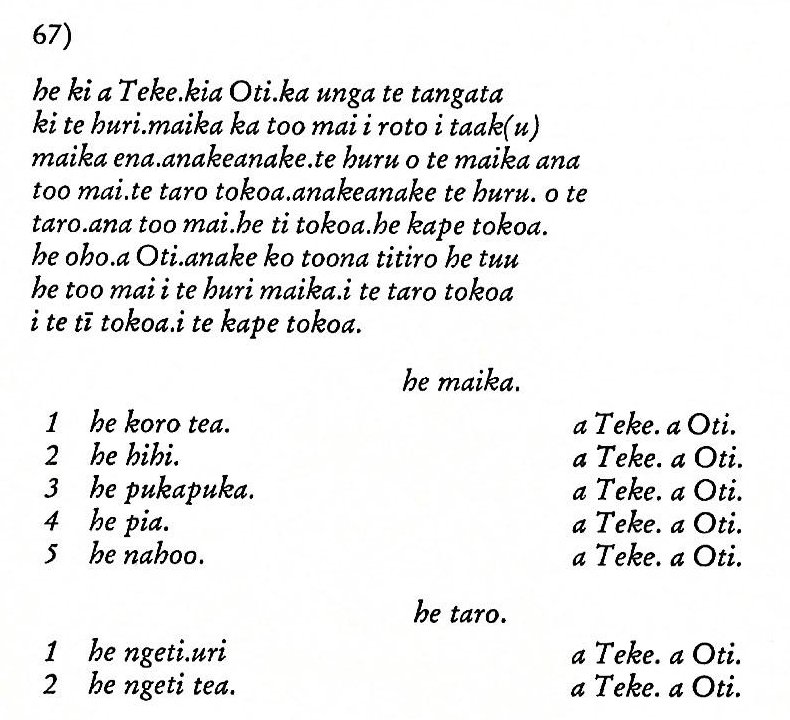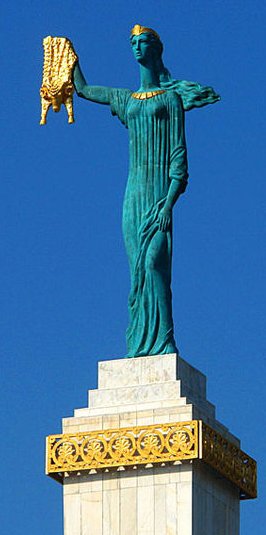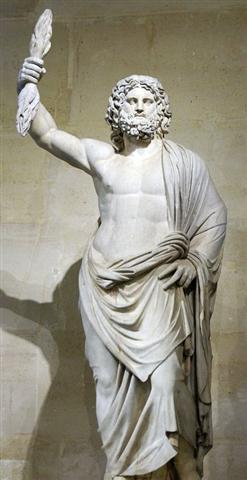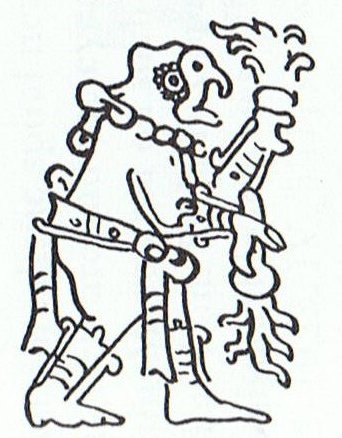
|
etoru te rau.te taropa.o te uhi.a Maeha.a |
Three
hundred [etoru te rau] baskets of yam (came)
from Maeha and Teke. |
|
Teke.he ki a Teke.ki
toona titiro.ka mau |
|
te taropa ena.ki runga
ki te miro.anake. |
Teke said
to his assistants [ki tona titiro], 'Take the
baskets on board the canoe!'
Then Teke said to Oti, 'Go to your friend (hoou),
to Pau (corrected for Bau) and ask [ka kī]
for sweet potatoes (kuma), which he is to
supply [ka avai mai]. And take even
more baskets along when you go!' [ana oho
koe]
Oti got up [he ea a Oti] and left with all
his companions.
They took along a thousand [etahi piere]
baskets. |
|
anake. |
|
he ki a Teke.kia
Oti.(k)a oho.koe.ki te hoou |
|
era.kia Bau
(sic!) era.ka kī
ki te kuma ka a(-) |
|
vai mai.e ata mau tau
taropa.ana oho koe |
|
he ea a Oti.he
oho.anake ko toona titiro. |
|
he mau i te taropa
etahi piere.te taropa |
|
E:65 |
|
he oho.he tuu ki te
hare o Bau (sic!) nui.o Bau (sic!)
iti, |
They went
and they came to the house of Pau Nui and Pau Iti.
Pau Nui and Pau Iti said, 'What do you people (mahingo)
want (?), what is going on?'
Oti said to Pau Nui and Pau Iti, 'The king is
sending me to get sweet potatoes, to bring them on
board the canoe.'
Pau Nui went out, pulled the sweet potatoes out
of the ground and threw them to the side. While
doing that he also enumerated the names of the sweet
potatoes. |
|
he ki mai a Bau
nui.raua ko Bau iti.ai ai ai |
|
korua ko tou mahingo.ai
ka pu ai ka pu.he ki |
|
mai a Oti.kia Bau
nui.raua kia Bau iti.he u(-) |
|
nga.mai au e te
ariki.ki te kumara.mo runga i te |
|
miro.he ea a Bau
nui.hee pakoo i te kumara |
|
he hoa ki te tapa.koia
ko ingoa i nape tokoa ai. |
|
o te kumara. |
| Ancient
expression: ai ka-pú, ai ka-pú, tell us
frankly what you think. Vanaga. |
|
E:66 |
|
etahi te piere. te taropa o te kumara. a Bau. |
A thousand baskets of
sweet potatoes are from Pau and Oti.
They tied up [he here] the baskets and Oti
said to his assistants, 'Take [ka mau] the
baskets and bring them on board the canoe [ki
runga ki te miro] and leave them there.' |
|
a Oti.he here tahi i te
ngutu o te taropa.he |
|
ki.a Oti.ki
toona.titiro.ka mau.ka oho. |
|
te taropa ena.ki runga
ki te miro.ka hakarere. |
|
E:67 |
|
he ki a Teke.kia Oti.ka
unga te tangata |
Teke said
to Oti, 'Send the men [ka unga te tangata]
for banana shoots. They shall take all kinds of
banana shoots [anakeanake.te huru o te maika] from my banana plantation, also taro,
all kinds of taro, furthermore ti (Cordyline
fruticosa) and kape (Alocasia macrorrhiza).' |
|
ki te
huri.maika ka too mai i
roto i taak(u) |
|
maika ena.anakeanake.te
huru o te maika ana |
|
too mai.te taro
tokoa.anakeanake te huru. o te |
|
taro.ana too mai.he ti
tokoa.he kape tokoa. |
| Huri.
1. To turn (vt.), to overthrow, to
knock down: huri moai, the overthrowing of
the statues from their ahus during the period
of decadence on the island. 2. To pour a
liquid from a container: ka huri mai te vai,
pour me some water. 3. To end a lament, a
mourning: he huri i te tagi, ina ekó tagi hakaou,
with this the mourning (for the deceased) is over,
there shall be no more crying. 4. New shoot
of banana: huri maîka. Vanaga. 1. Stem. P
Mgv.: huri, a banana shoot. Mq.: hui,
shoot, scion. 2. To turn over, to be turned over
onto another side, to bend, to lean, to warp;
huri ke, to change, to decant; tae huri ke,
invariable; huri ke tahaga no mai, to change
as the wind; tae huri, immovable; e ko
huri ke, infallible; huhuri, rolling;
hakahuri, to turn over; hakahuri ke, to
divine. P Pau.: huri, to turn. Mgv.: huri,
uri, to turn on one side, to roll, to turn
upside down, to reverse. Mq.: hui, to turn,
to reverse. 3. To throw, to shoot. 4. To water, to
wet. 5. To hollow out. Hurihuri: 1. Wrath,
anger; kokoma hurihuri, animosity, spite,
wrath, fury, hate, enmity, irritable, quick
tempered, to feel offended, to resent, to pester;
kokoma hurihuri ke, to be in a rage. 2. (huri
4) hurihuri titi, to fill up. 3. To polish.
4. (uriuri). Hurikea, to transfigure,
to transform. Churchill. Mq. huri,
resemblance. Sa.: foliga, to resemble.
Churchill. Huru. Custom, tradition,
behaviour, manners, situation,
circumstances; poki huru hare, child who
stays inside (to keep a fair complexion); te huru
o te tagata rivariva, a fine person's behaviour;
pehé te huru o Hiva? what is the situation on
the mainland? Huruhuru, plumage,
feathers (the short feathers, not the tail
feathers), fleece of sheep. Vanaga. Samoa:
sulu, a torch; to light by a torch; sulusulu,
to carry a torch; susulu, to shine (used of
the heavenly bodies and of fire). Futuna: susulu,
the brightness of the moon. Tonga: huluaki,
huluia, huluhulu, to light, to
enlighten; fakahuhulu, to shine; iuhulu,
a torch or flambeau, to light with a torch. Niuē:
hulu, a
torch; huhulu,
to shine (as the moon). Maori: huru,
the glow of the sun before rising, the glow of fire.
Churchill 2. |
|
he oho.a Oti.anake ko
toona titiro he tuu |
Oti and all
his assistants went away, arrived, and took some of
the banana shoots as well as taro, ti, and kape. |
|
he too mai i te huri
maika.i te taro tokoa |
|
i te tī tokoa.i te kape
tokoa. |



|